
If you're looking to capitalize on the industrial real estate sector, industrial real estate investment trusts (REITs), also known as warehouse REITs, are publicly traded companies that own and operate income-generating properties in the industrial sector.
Companies like Ares Industrial REIT, Plymouth Industrial REIT, Prologis REIT and Dream Industrial REIT are on an industrial REITS list of players in the industry. But what are industrial REITs, and what sets them apart from other real estate investment opportunities?
We'll dig into the key attributes of the best industrial REITs, presenting you with a list of industrial REITs while showing you how to analyze and invest in the industrial REIT of your choosing.
What is an Industrial REIT?
An industrial REIT is a specialized type that focuses on owning, operating and investing in income-generating properties within the industrial sector. These properties primarily include warehouses, distribution centers, logistics facilities and other industrial real estate assets. Industrial REITs own a diverse portfolio of properties designed to generate rental income. These properties serve as crucial hubs for storage, distribution and logistics, attracting tenants from various industries.
The primary emphasis of industrial REITs is on warehouse spaces and logistics facilities. These properties play a critical role in the supply chain, accommodating the storage and movement of goods for manufacturers, retailers and e-commerce companies.
To mitigate risk and capitalize on multiple market opportunities, industrial REITs maintain a well-diversified portfolio of properties across different regions and sectors of the industrial market. They also strategically position their properties near major transportation routes, ports and population centers, enhancing their appeal to tenants seeking efficient distribution solutions.
One of many subcategories of industrial REITs, known as logistics REITs, is focused on properties that facilitate the efficient movement of goods and services throughout the supply chain. These properties typically include distribution, fulfillment and other logistics-related facilities. E-commerce has significantly boosted the demand for logistics properties, making logistics REITs an appealing investment choice within the broader realm of industrial REITs.
When considering investment options, investors can explore a comprehensive list of industrial REITs to gain exposure to the industrial real estate sector. From the largest industrial REITs to the smallest ones, industrial REITS can be a lucrative addition to your investment portfolio.
Overview of Industrial REITs
Industrial REITs have become a compelling investment option in the real estate market. These specialized REITs focus on owning, operating and investing in income-generating industrial properties, making them attractive to investors interested in the dynamic industrial sector. Industrial REITs maintain diverse portfolios comprising warehouses, distribution centers, logistics facilities, manufacturing plants, data centers and other industrial spaces. By diversifying their property holdings across different types and regions, these REITs aim to spread risk and seize growth opportunities.
The primary revenue source for industrial REITs is rental income from tenants occupying their properties. With businesses seeking efficient warehousing and distribution solutions, these REITs are crucial in providing strategically located and well-equipped industrial spaces, resulting in a steady stream of rental income. The growth of the e-commerce industry has significantly driven the demand for logistics facilities and last-mile distribution centers, benefiting industrial REITs. Technological advancements in technology and supply chain optimization require modern and technologically advanced industrial properties.
Tenant diversity is a priority for industrial REITs to reduce risks associated with over-reliance on a single industry or tenant. Their properties attract tenants from various sectors, including e-commerce, retail, manufacturing and logistics. Long-term lease agreements provide stability and predictability in the industrial REIT's income generation strategy.
Investors must evaluate key metrics such as funds from operations (FFO), net operating income (NOI), occupancy rates, lease expirations and tenant retention rates to assess industrial REITs' financial health and performance. While industrial REITs face various risks, including economic downturns and interest rate fluctuations, their diversified property portfolios, long-term lease agreements and focus on essential industries help mitigate some risks.
To qualify as REITs, these companies must meet specific regulatory requirements, including distributing at least 90% of their taxable income to shareholders as dividends. By adhering to these regulations, industrial REITs enjoy tax advantages, avoiding double taxation at the corporate level.
7 Industrial REITs to Consider in 2023
As the real estate landscape continues to evolve, the industrial sector stands out as a dynamic and resilient market, driven by the surge in e-commerce, supply chain optimization and increased demand for modern warehousing and distribution facilities.
If you seek to capitalize on these trends and access the potential of the industrial real estate market, industrial REITs offer a compelling avenue. Let's review a carefully curated selection of prominent REITs that have demonstrated strength, stability and growth prospects in the industrial sector. With these seven industrial REITs, you can position your portfolio to benefit from the ongoing evolution and opportunities in the industrial market.
Prologis Inc. (NYSE: PLD)
Prologis Inc. (NYSE: PLD), a formidable force in the industrial (REIT) sector, was founded in 1983 and has its headquarters in San Francisco, California. With a remarkable presence in over 19 countries and territories worldwide, Prologis has established itself as a global industrial property market player. Prologis attracts investors worldwide, solidifying its position as an industry leader.
With a large market capitalization of over $90 billion, the company's scale and financial prowess are second to none in the industrial REIT space. Prologis's impressive global footprint, extensive operations and dominant market capitalization make it an undeniable choice for our list of the best industrial REITs. As a long-established and well-respected company, Prologis has built a reputation for delivering consistent performance and generating value for its investors.
If you choose to include Prologis in your investment portfolio, you will gain access to a company with a substantial international presence and a proven track record of success. The company's global operations offer diversification benefits, allowing investors to participate in various markets and capitalize on emerging opportunities. Moreover, Prologis's New York Stock Exchange (NYSE) listing provides easy access to its shares for investors seeking liquidity and transparency. The company's immense market capitalization indicates its financial stability and attractiveness to institutional investors.
If you seek stability, international exposure or the potential for significant capital gains, Prologis Inc. presents a compelling case as a powerhouse in industrial REITs. After purchasing, you will want to monitor Prologis's analyst ratings for any changes in sentiment from the analysts. Monitoring these ratings can offer valuable insights into the market's perception of Prologis and any shifts in sentiment that may impact the stock's performance. Staying informed about the latest analyst reports can help investors make well-informed decisions and stay ahead of potential market trends related to Prologis Inc.
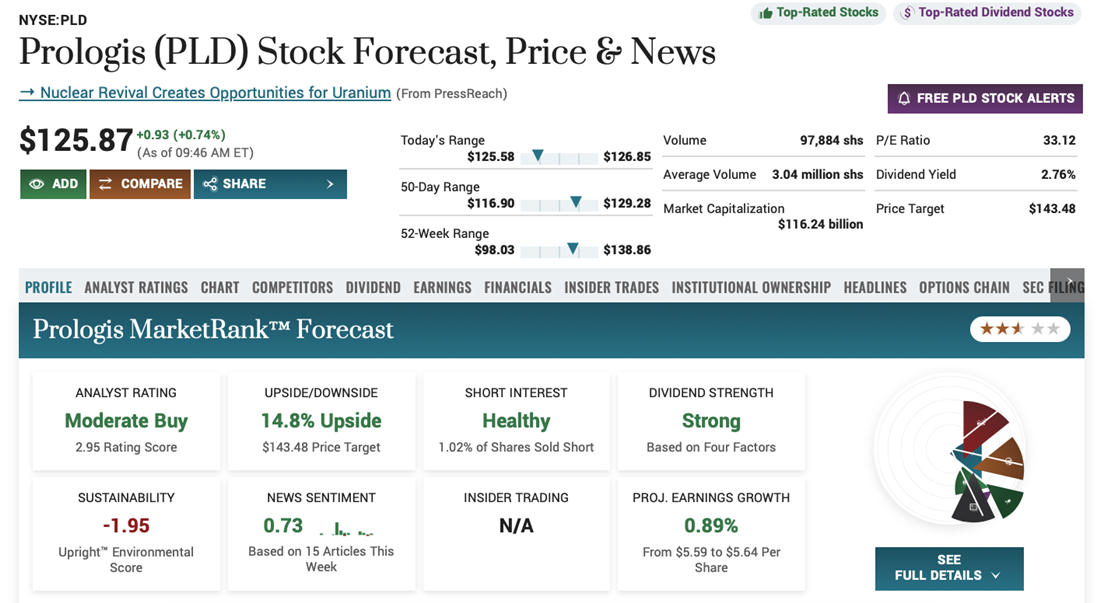 Stag Industrial Inc.
Stag Industrial Inc.
Headquartered in Boston, Stag Industrial Inc. (NYSE: STAG) has made significant strides in the industrial real estate landscape since its establishment in 2010. With a dynamic portfolio that boasts over 550 buildings spread across 40 states, encompassing approximately 110.1 million rentable square feet, Stag Industrial has cemented its position as a leading provider of industrial properties. Stag Industrial's remarkable growth trajectory and dedication to infill properties secure its well-deserved place among the best industrial REITs.
The company's strategic focus on properties in major metropolitan areas continues to attract a robust demand from tenants seeking prime locations for their business operations. Moreover, the company's strong dividend yield further adds to its appeal, presenting an enticing option for investors searching for reliable income streams.
If you seek exposure to the industrial real estate market with promising growth prospects, Stag Industrial offers an excellent opportunity. The company's extensive portfolio, encompassing diverse properties across 40 states, positions it favorably to capitalize on the ever-expanding landscape of e-commerce and logistics operations. The company's total assets total over $7 billion, which is just one of Stag Industrial's financial metrics that indicate the company's financial stability and capacity for continued expansion. Additionally, its dividend yield makes it an attractive option for income-seeking investors, providing an opportunity for steady returns. Stag Industrial Inc. is a pioneering force in the industrial real estate sector.
Founded in 2010 and boasting an extensive and strategically located portfolio, the company thrives as a preferred choice for investors seeking income-yielding industrial REITs focusing on infill properties. With a solid financial position, substantial assets and a history of delivering steady dividends, Stag Industrial presents an enticing option for investors looking to capitalize on the ever-evolving industrial landscape and secure a promising future for their portfolios.
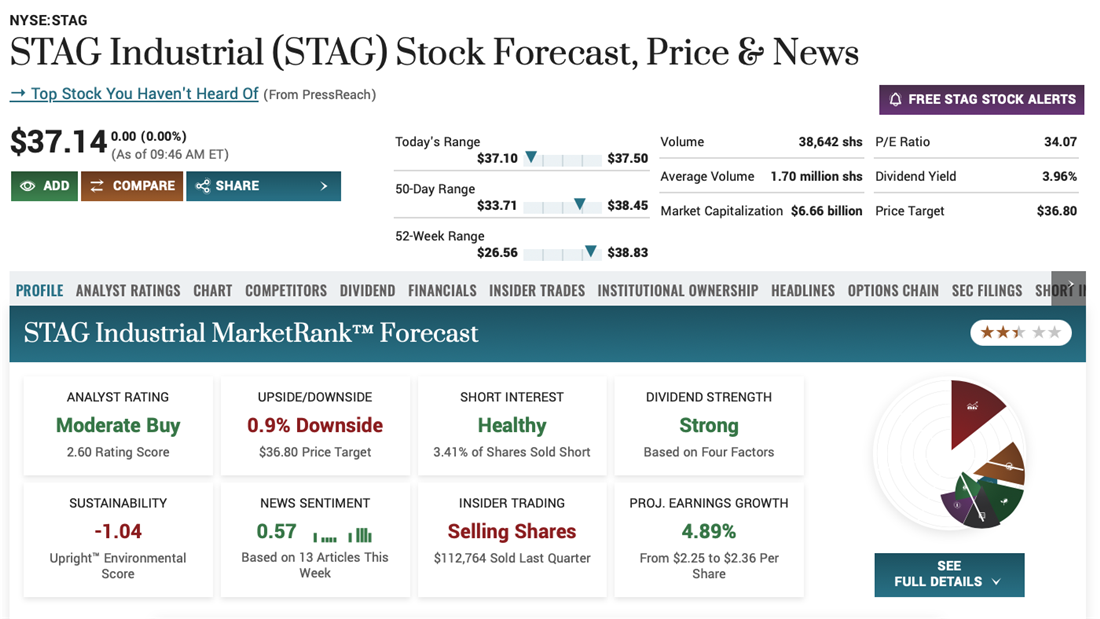 Public Storage
Public Storage
Public Storage (NYSE: PSA) is a compelling REIT choice for investors seeking a defensive income-producing asset. As the largest self-storage REIT worldwide, Public Storage maintains an extensive portfolio comprising over 2,400 self-storage facilities strategically positioned across the United States and Europe. This dominant market presence ensures a reliable revenue stream and an attractive dividend yield for investors.
However, consider certain factors first. While Public Storage boasts a strong history of profitability and consistent dividend payments, its financial performance has recently fluctuated. Carefully examine the reasons behind these fluctuations and assess the company's financial stability.
Furthermore, the self-storage industry is witnessing increased competition as new entrants enter the market. Although Public Storage is a market leader, you should closely monitor its strategies to ensure it maintains a competitive edge and protects its margins in this evolving landscape.
In addition to market dynamics, consider the regulatory environment surrounding the self-storage industry. Regulation changes could impact Public Storage's operational framework, and staying informed about any regulatory developments is essential in evaluating this investment opportunity. Stay on top of Public Storage (NYSE: PSA) 's news feed and Public Storage's SEC filings to closely monitor the company for any changes.
Despite these considerations, Public Storage remains a strong contender in the REIT space. Its well-established business model and extensive market presence reassure investors in a potentially uncertain market. Additionally, the company's significant presence in major markets offers diversification benefits, further bolstering its appeal as a dependable investment option.
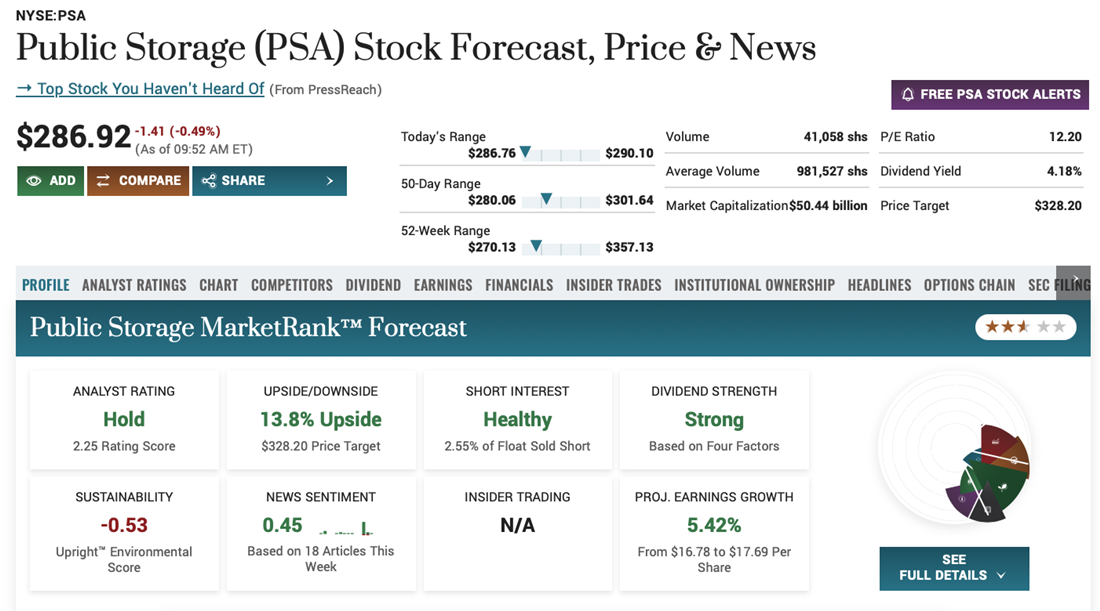 Innovative Industrial Properties Inc.
Innovative Industrial Properties Inc.
Innovative Industrial Properties Inc. (NYSE: IIPR) is the largest and most well-known industrial REIT specializing in properties leased to medical marijuana growers and processors. With a portfolio of over 60 properties strategically located in states with legalized medical marijuana, the company offers investors a unique opportunity to capitalize on the rapid growth of the medical marijuana industry. As the medical marijuana industry expands, Innovative Industrial Properties is well-positioned to benefit from the increasing demand for real estate solutions from medical marijuana operators. The company's strong track record of growth makes it appealing as an investment option.
With the medical marijuana sector still in its early stages of development, there is considerable room for growth, and Innovative Industrial Properties stands at the forefront of providing real estate solutions for this emerging market.
However, it is essential to be mindful of the associated risks. The medical marijuana industry's growth is subject to various factors, including regulation changes and increased competition. Therefore, conducting thorough research and monitoring Innovative Industrial Property's news headlines for industry developments is crucial for making informed investment decisions. Innovative Industrial Properties presents an attractive choice for investors looking to capitalize on the high-growth potential of the medical marijuana industry through a specialized industrial REIT.
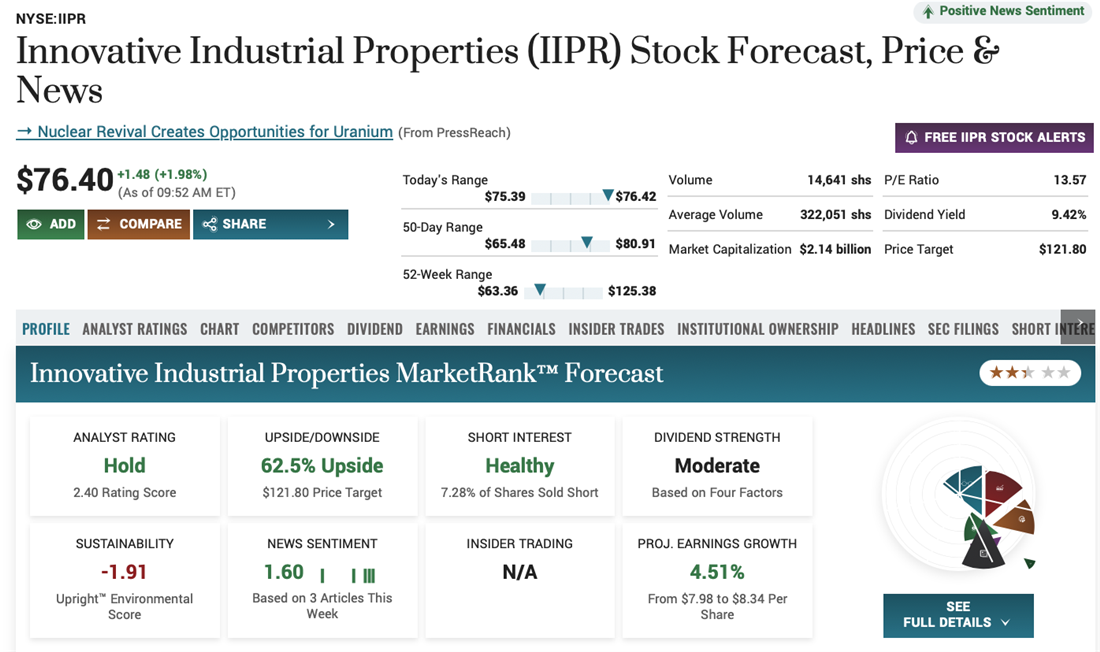 Ares Management (NYSE: ARES)
Ares Management (NYSE: ARES)
Ares Industrial Real Estate Income Trust (AIREIT), trading as Ares Management (NYSE: ARES), is a relatively new player in the industrial real estate market. The company focuses on acquiring infill industrial properties in major metropolitan areas, with its portfolio comprising over 100 properties primarily concentrated in the East Coast and Midwest regions.
Ares Industrial REIT is a good choice for investors looking for a growth-oriented industrial REIT focusing on urban markets. The selection of Ares Industrial REIT stems from its distinct emphasis on growth as a newer industrial REIT. The company has a strong management team with a proven track record of success, positioning it to harness the potential growth opportunities presented by e-commerce and other economic trends. Ares Industrial REIT is also a good choice for investors looking for a more diversified industrial REIT.
Ares Industrial REIT is an enticing option to seek a growth-oriented industrial REIT that strategically capitalizes on opportunities within major metropolitan areas. The company's portfolio's strategic location in bustling urban centers sets it up to benefit from the anticipated growth of e-commerce and other economic developments. Moreover, the strong management team's track record instills confidence in potential investors. However, it is crucial to acknowledge the potential risks associated with investing in a newer industrial REIT like Ares Industrial REIT. As a relatively young player in the industry, it may not have the extensive track record of more established counterparts. Additionally, the cyclical nature of the industrial real estate market entails the possibility of market downturns, which may impact the REIT's performance. You will want to monitor Ares Management's earnings data and Ares financial information continually, looking for any signs of instability.
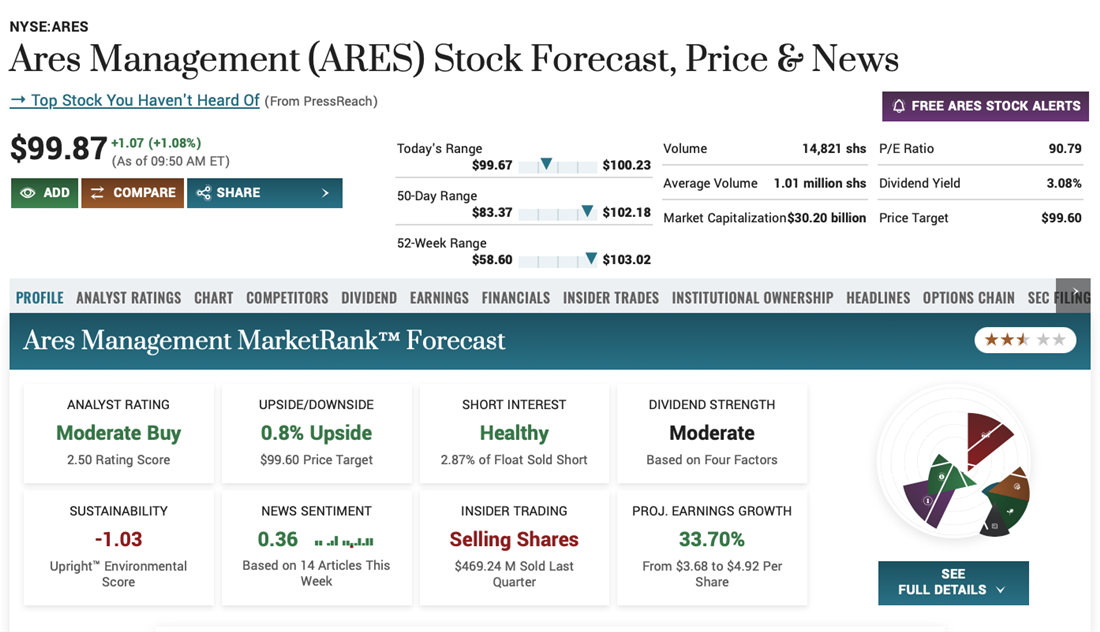 Plymouth Industrial REIT (NYSE: PLYM)
Plymouth Industrial REIT (NYSE: PLYM)
Plymouth Industrial REIT (NYSE: PLYM) is a reputable mid-cap industrial REIT with a strategic focus on light industrial properties in the Northeast and Mid-Atlantic regions. Boasting a diverse portfolio of over 100 properties, Plymouth Industrial REIT is an appealing choice for a high-yielding industrial REIT concentrating on regional markets. The company's strategic positioning in these key industrial markets sets the stage for growth and success. If you are looking for a high-yielding industrial REIT with exposure to regional markets, you will find Plymouth Industrial REIT a worthy addition to your portfolio. With its property holdings situated in major industrial markets, the company stands to benefit from the ongoing growth in e-commerce and other economic trends in those regional areas. Furthermore, the REIT's impressive dividend yield is desirable for those seeking regular income.
Considering the potential risks associated with investing in Plymouth Industrial REIT is essential. As the company concentrates on regional markets, it may lack the diversification seen in other industrial REITs. Additionally, like any industrial real estate investment, the risk of cyclical downturns in the market remains. While Plymouth Industrial REIT boasts a strong track record of growth, its financial performance has experienced some volatility in recent years. Staying informed about its financial progress is crucial to assess whether it aligns with its financial objectives. As the industrial real estate market grows more competitive and new entrants compete with Plymouth Industrial REIT, its lack of diversification may leave it subject to margin pressures. Monitoring the competitive landscape for Plymouth Industrial REIT is critical to ensuring the REIT maintains its competitive advantage.
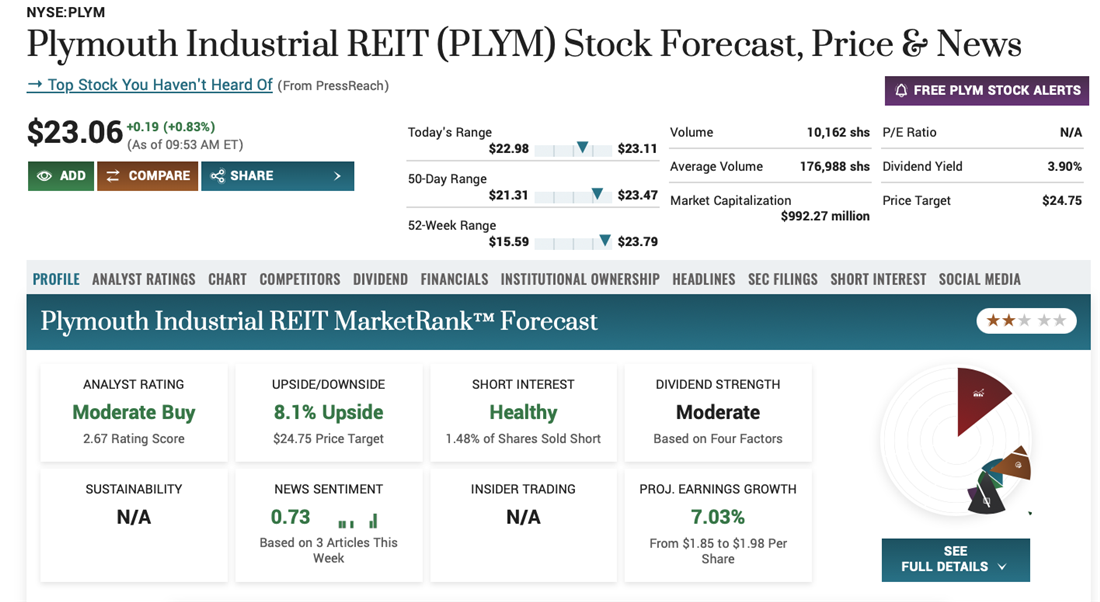 Dream Industrial REIT
Dream Industrial REIT
Dream Industrial REIT (OTCMKTS: DREUF) is a Canadian industrial REIT specializing in light industrial properties in Toronto. With an extensive portfolio comprising over 100 properties, Dream Industrial REIT offers an appealing opportunity for investors seeking exposure to the Canadian industrial market.
As one of Canada's largest and most vital industrial markets, it presents substantial growth potential. Dream Industrial REIT is an excellent choice to gain exposure to the Canadian industrial market. As the greater Toronto area continues to flourish, this REIT offers a valuable entry point to tap into its growth. Additionally, Dream Industrial REIT boasts strong management and a proven track record of success, providing further confidence to potential investors.
The company boasts a Canadian industrial REIT with over 100 light industrial properties, primarily focused on the greater Toronto area. Investing in Dream Industrial REIT entails certain risks. The company's focus on a single market could lead to reduced diversification compared to other industrial REITs. Furthermore, considering the cyclical nature of the Canadian economy, there is an inherent risk associated with downturns in the market. With new entrants entering the industrial real estate market in Toronto, there is increasing competition which could impact Dream Industrial REIT's margins in the future.
Staying abreast of the competitive landscape by monitoring Dream Industrials' competitors will help assess the REIT's ability to maintain its competitive advantage. Canada's industrial real estate market is subject to varying regulations that may evolve. These changes could influence Dream Industrial REIT's business operations, making it essential to stay informed about regulatory developments that could impact the company.
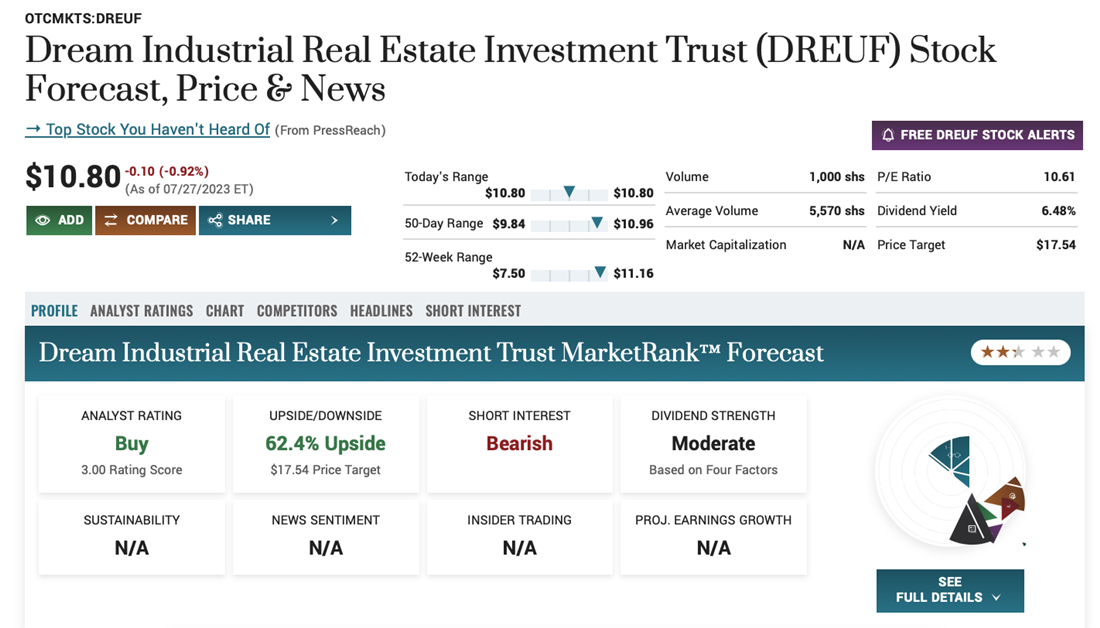 How to Invest in Industrial REITs
How to Invest in Industrial REITs
As the real estate landscape continues to evolve, the industrial sector stands out as a dynamic and resilient market, driven by the surge in e-commerce, supply chain optimization and increased demand for modern warehousing and distribution facilities.
If you seek to capitalize on these trends and access the potential of the industrial real estate market, industrial Real Estate Investment Trusts (REITs) offer a compelling avenue. Investing in industrial REITs can expose you to a diverse portfolio of industrial properties while enjoying the benefits of steady income streams and the potential for capital appreciation.
Let's review the process of how to invest in industrial REITs, helping you make informed decisions so that you can select the right REIT that best aligns with your investment goals and risk tolerance.
Step 1: Define your investment goals.
Before venturing into any investment, it's essential to determine your investment objectives. Consider whether you seek a steady income stream through dividends, long-term capital appreciation or a balanced approach combining both. Understanding your goals will guide you in selecting the most suitable industrial REIT that aligns with your financial aspirations.
Step 2: Research and analyze REITs.
Conduct comprehensive research on various industrial REITs available in the market. Analyze portfolios, geographical focus, property types and management team. Evaluate financial performance, dividend history and growth prospects. Take the time to review the most recent earnings transcripts. Look for REITs with a proven track record and a strong presence in high-growth sectors like e-commerce and logistics.
Step 3: Evaluate market positioning.
Assess each REIT's positioning in the industrial real estate market. Look for REITs focusing on major metropolitan areas and regions experiencing rapid growth. Consider how market positioning and property holdings align with the current and future trends in the industrial sector.
Step 4: Assess risk factors.
Investing in industrial REITs carries inherent risks. Evaluate factors like economic cycles, market competition and regulatory changes that could impact the REIT's performance. Consider the risks against the rewards to make an informed investment decision.
Step 5: Diversify your portfolio.
Avoid concentrating your investment capital on a single REIT. Diversification helps spread risk across multiple assets, reducing the impact of any individual REIT's performance on your portfolio. Consider a mix of REITs with varying market focuses and risk profiles.
Step 6: Consult with a financial advisor.
Seek guidance from a financial advisor or professional specializing in real estate investments. They can help assess your risk tolerance, financial capacity and investment objectives. Financial advisors can offer valuable insights and tailor advice to your needs, helping you make sound investment decisions.
Step 7: Open a brokerage account and invest.
Once you've thoroughly researched and selected the industrial REITs that align with your goals and risk tolerance, it's time to invest. Open an investment account with a brokerage and purchase the REIT shares according to your investment strategy.
Continuously monitor the performance of your chosen REITs and stay informed about market trends and industry developments. Investing in industrial REITs requires diligence and a long-term perspective, but it can provide opportunities to benefit from the ongoing evolution and opportunities in the industrial real estate market.
Pros and Cons of Industrial REITs
Industrial Real Estate Investment Trusts (REITs) have advantages and disadvantages, as with any investment. Understanding the pros and cons of investing in industrial REITs is essential for making informed decisions and managing expectations. Let's explore the benefits and potential drawbacks of industrial REIT investments.
Whether considering diversifying your portfolio, seeking stable income streams or exploring growth opportunities, a thorough understanding of the pros and cons will equip you to make sound investment choices in industrial REITs.
Pros
Industrial Real Estate Investment Trusts (REITs) offer investors a compelling avenue to capitalize on the dynamic and resilient industrial sector. With the surge in e-commerce, supply chain optimization and increased demand for modern warehousing and distribution facilities, industrial REITs have garnered attention as a potential addition to investment portfolios. Exposure to industrial REITs provides you with the following:
- Diversification: Industrial REITs offer a diverse portfolio of properties across various locations and sectors, mitigating risk and providing stability.
- Passive income: Through steady rental income, industrial REITs offer a reliable source of passive income, making them attractive to income-seeking investors.
- Professional management: Investors benefit from professional property management, relieving them of day-to-day responsibilities associated with real estate ownership.
- Liquidity: Being publicly traded, industrial REITs provide high liquidity, enabling quick access to investment funds.
- Lower barriers to entry: Industrial REITs offer exposure to the real estate market without significant capital or property management expertise.
- Growth potential: As the industrial sector experiences growth, industrial REITs may offer capital appreciation potential as property values increase.
- Market expertise: Managed by experienced professionals, industrial REITs benefit from market research and industry trends.
- Inflation hedge: Rental income linked to inflation rates can act as a hedge against rising inflation.
- Easier portfolio diversification: Adding industrial REITs to a diversified portfolio enhances risk-adjusted returns without requiring direct property ownership.
Cons
Industrial REITs offer an enticing avenue to participate in the dynamic industrial sector, driven by e-commerce growth and increased demand for modern warehousing facilities. As with any investment, being aware of potential drawbacks is essential. Let's explore the possible cons of investing in industrial REITs, shedding light on aspects that investors should consider carefully before making investment decisions.
- Market volatility: Industrial REITs can be influenced by economic cycles and real estate market trends, leading to fluctuations in their stock prices. During economic downturns, demand for industrial properties may decline, impacting the REIT's performance.
- Interest rate sensitivity: Industrial REITs are sensitive to changes in interest rates. Rising interest rates can lead to higher borrowing costs, potentially affecting the REIT's profitability and stock performance.
- Concentration risk: Some industrial REITs may have a concentrated portfolio in specific geographic regions or property types, and this concentration can expose investors to higher risk if those regions or property sectors face economic challenges.
- Regulatory and environmental risks: Industrial properties may be subject to environmental regulations and liabilities, which could impact the REIT's financials if they face compliance issues or remediation costs.
- Lease expirations and tenant turnover: Lease expirations and tenant turnover can affect a REIT's cash flow and occupancy rates. Finding new tenants or renewing leases at favorable terms may pose challenges.
- Inflation impact: Inflation can affect operating costs and property values. Industrial REITs may face challenges in passing increased costs to tenants in the short term.
- Limited control: As a passive investor in a REIT, you have limited control over the company's management decisions. The REIT's management team determines property acquisitions, dispositions and other strategic decisions.
In the REIT Direction
As we conclude our journey through the industrial REIT realm, it becomes evident that these investment vehicles offer a compelling avenue for investors seeking exposure to the dynamic and resilient industrial real estate market. From industry giants like Prologis Inc., with its global scale and financial prowess, to specialized players like Innovative Industrial Properties Inc., capitalizing on the rapid growth of the medical marijuana industry, the options are vast.
Investing in Industrial REITs opens doors to lucrative opportunities in the surge of e-commerce, supply chain optimization and increased demand for modern warehousing and distribution facilities. While each REIT presents its distinct set of pros and cons, it is essential to carefully evaluate these factors in line with your investment objectives, risk tolerance and portfolio diversification strategy.
As you venture forth in the REIT direction, conduct thorough research, stay informed about market dynamics and regulatory changes and seek professional advice if needed. By leveraging the knowledge gained from this exploration, you can confidently position your portfolio to benefit from the ongoing evolution and opportunities in the industrial market. In the exciting landscape of industrial REITs, informed decisions pave the way for promising returns and potential long-term success.
FAQs
Let's take a moment to address some of the most common questions and concerns. To provide clarity and guidance, we have curated a comprehensive list of frequently asked questions covering various aspects of investing in Industrial REITs.
What is the largest industrial REIT?
Prologis Inc. (NYSE: PLD) is the largest industrial REIT in the world. With its headquarters in San Francisco, California, Prologis boasts a formidable global presence, operating in over 19 countries and territories. As a market leader, Prologis manages an extensive portfolio of industrial properties, primarily focused on logistics and distribution centers. The company's substantial market capitalization, exceeding $90 billion, underscores its significant scale and financial strength, solidifying its position as a powerhouse in the industrial REIT sector.
What is an example of an industrial REIT?
An example of an industrial REIT is Stag Industrial Inc. (NYSE: STAG). Headquartered in Boston, Massachusetts, Stag Industrial has emerged as a prominent player in the industrial real estate landscape since its establishment in 2010. The company's dynamic portfolio comprises over 500 buildings spread across 40 states and encompasses approximately 110.1 million rentable square feet. Stag Industrial's strategic focus on light industrial properties in major metropolitan areas positions it as a leading industrial real estate solutions provider.
What does an industrial REIT do?
An industrial REIT is a real estate investment trust that primarily invests in and manages industrial properties. These properties can include warehouses, distribution centers, manufacturing facilities and other commercial spaces used for industrial purposes. Industrial REITs generate revenue through leasing these properties to tenants, such as logistics companies, e-commerce retailers, manufacturers and other businesses. The rental income from the properties forms the basis for distributing dividends to the REIT's shareholders. Industrial REITs often focus on strategic locations, key industrial markets and well-suited properties to meet the demands of modern supply chain logistics and e-commerce.














